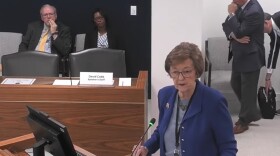Republican lawmakers want to eliminate vacant jobs across state government this year. But some existing state employees would lose their jobs under the House and Senate budget bills.
One of the positions cut in the Senate budget is the role of chief scientist at the Office of State Budget and Management. David Yokum has served as the chief scientist since 2022. He says he learned his job was in jeopardy when the budget bill was made public.
"I was surprised," he told WUNC. "I don't know where it came from ... you'd have to ask people in the Senate, and you can let me know, and I'll listen if you get the answer."
I asked Senate leader Phil Berger's spokesperson why certain jobs were targeted for cuts. Lauren Horsch said in an email that Senate budget writers were tasked with finding spending that was "duplicative or not necessary to meet our state’s needs."
"Each budget area (committee chair) had the flexibility to make those determinations," she wrote.
She didn't elaborate, so I asked Yokum to explain what a scientist does in a budget agency.
He says he's "really focused on trying to help the budget office and the whole budget development process take stock of what existing evidence is already out there about how well programs are working, policies are working, and make sure that that's finding its way into the budget development discussion, so that as we're deciding how to spend scarce taxpayer dollars, we can do that with the best information possible."
Yokum's work is on the chopping block in a year when Republicans across the state and federal government are launching similar government efficiency efforts. In addition to Elon Musk's "DOGE" program, the state House and the state auditor have created programs to dig into whether government programs are working well.
"I would like to think that the work that we're doing, that I've been describing, is very much something welcome in this moment, and has been from people across all kinds of different perspectives," Yokum said.
The N.C. Department of Commerce would also lose current employees. Both the House and Senate would cut its Culture and Community Engagement Office, which until recently was known as the Diversity, Equity & Inclusion Office.
The Senate budget would fire the deputy secretary for clean energy economic development. Chief Deputy Secretary Jordan Whichard says the cuts are concerning.
"These are both important positions that have been impactful to the Department of Commerce and the state's ability to recruit and retain businesses at a very high level," he said. "I think both of their work is part of why we've been in the top two in the country in business climate for the past several years."
Whichard says the clean energy role is important because many of the companies the state is recruiting are heavy users of energy and utility infrastructure. The agency's website says Jennifer Mundt "leads efforts in securing energy-related economic and workforce opportunities for North Carolina." The word "clean" was recently removed from her official job title, and she's now known as the assistant secretary for energy and infrastructure.
Lawmakers are also looking to cut positions related to the environment. Both budgets called for eliminating the Office of Environmental Education and the Environmental Justice Initiative.
Some of the positions slated for cuts at the Department of Environmental Quality handle civil rights compliance, and one has a leadership role in the ongoing Helene recovery.
House labels job cuts as 'DEI'
But House leaders argued the positions and programs they're cutting are related to diversity, equity and inclusion that lawmakers have voted to eliminate.
"We estimated over $10 million in unaccountable DEI spending, and cut bureaucracy and the dividends that provides and delivers for this budget," House Majority Leader Brenden Jones said. "That money is now going where it belongs — into classrooms, into the communities and the disaster recovery."
House Speaker Destin Hall says budget writers looked for programs and positions that used words like "equity."
"We think that the money ought to go towards investing in state employees and not doing things based upon improper motives, but simply looking at what's the best for state government," he said.
But Rep. Marcia Morey, D-Durham, says it's misguided to make DEI the standard for budget cuts. "It's about everyone learning about how our society is stronger and better with diversity, equity and inclusion," she said. "It is that simple. And to use that as a scapegoat for 'let's get rid of these provisions in the budget or agencies or work groups,' I think that's a non-starter."
By focusing on programs that Republicans view as examples of DEI, the House budget doesn't include some of the job cuts in the Senate budget.
Yokum, the budget office chief scientist, and the clean energy deputy secretary would keep their jobs under the House budget bill.
The House also dropped its initial plan to eliminate the Office of Health Equity at the Department of Health and Human Services, which works on health disparities among marginalized groups.
Rep. Donny Lambeth, R-Forsyth, says the office was restored following feedback. "It's a good example of where we've listened to a lot of people, even with the budget when it came out," he said. Lambeth also later restored funding in the House budget for the Office of Environmental Education after Democrats raised objections, although the cut remains in the Senate plan.
The budget could get more tweaks as it goes through negotiations between the House and Senate leaders in the coming weeks. But in an unusually tight budget year, it's likely some of the job cuts will make the final spending plan.







